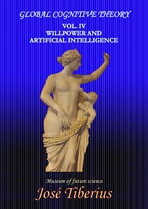WILLPOWER AND THE DECISION-MAKING PROCESS
1. Evolutionary psychology and willpower
The fourth online book of the Global Cognitive Theory is Willpower, Decision Making Process, and Artificial Intelligence and it is an attempt to explain the essence of the living being from a scientific viewpoint while taking into account it is a typical topic of philosophy.
The scientific nature is due to the connection with the Global Cognitive Theory about cognitive processes of the brain and evolutionary psychology, confirmed largely by the EDI Study – Evolution and Design of Intelligence.

The Global Cognitive Theory is an extension to the psychology of the new perspective of life given by the General Theory of Conditional Evolution of Life.
Not in vain, the ideas included in this evolutionary theory are about the philosophy and definition of life.
The fundamental characteristic of life, according to the Conditioned Evolution of Life, is precisely freedom; an aspect that presents itself through the free will of the living beings.
Therefore, without understanding the most important propositions of the two theories previously mentioned, it will be challenging to comprehend the complex ideas described in this little book about evolutionary psychology, willpower and the essence of the living being.
As well as this introduction, there are four additional chapters. Two of them concern the decision-making process, analyzed from a descriptive and scientific point of view; the other two deal with the concept of the existence of the living being, from a philosophical and metaphysical perspective.
The decision-making process studies the source of the wishes, ideas, and thoughts through the mechanisms of willpower formation, such as automated decisions, reflexive and semi reflexive actions, and decision processes based on majorities, which end up configuring groups of neurons as accurate political representation systems in the brain.
The willpower processes are dynamic equilibrium systems; that is to say, given the same external conditions, there is no guarantee the equilibrium point will be the same. We are talking about expert systems with dynamic equilibrium, which incorporate the result of earlier life experiences.
A case would be emotions, which are no more than unconscious responses to certain stimuli, which identify the presence of a complicated situation, requiring a fast answer despite there is not enough time to study it satisfactorily.
Additionally, there are some thoughts on partial aspects of schizophrenia regarding evolutionary psychology and the decision-making process.
The fourth chapter is about the human being, feelings, and willpower, given that they are concepts closer to human readers. However, it refers to the living being and the vital impulse systems because according to the proposed evolutionary psychological theory, feelings and willpower are essential elements of life.
To avoid byzantine terminological discussions, we consider emotions as neuronal mechanisms of a scientific nature; and feelings as belonging to the realm of philosophy and metaphysics.
At this point, there is the most exciting and poetic part of the previous theories, the spatial and temporal discontinuity of the existence of the living being.
The definition of artificial intelligence is the last challenge in this book.
We hope the reader finds useful the ideas shared during those moments in which we all brood, our minds and our hearts, about what we are, where we come from, and where we are going.
